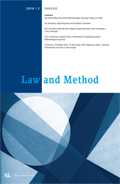|
In legal education, criticism is conceived as an academic activity. As lecturers, we expect from students more than just the expression of their opinion; they have to evaluate and criticize a certain practice, building on a sound argumentation and provide suggestions on how to improve this practice. Criticism not only entails a negative judgment but is also constructive since it aims at changing the current state of affairs that it rejects (for some reason or other). In this article, we want to show how we train critical writing in the legal skills course for first-year law students (Juridische vaardigheden) at Vrije Universiteit Amsterdam. We start with a general characterization of the skill of critical writing on the basis of four questions: 1. Why should we train critical writing? 2. What does criticism mean in a legal context? 3. How to carry out legal criticism? and 4. How to derive recommendations from the criticism raised? Subsequently, we discuss, as an illustration to the last two questions, the Dutch Urgenda case, which gave rise to a lively debate in the Netherlands on the role of the judge. Finally, we show how we have applied our general understanding of critical writing to our legal skills course. We describe the didactic approach followed and our experiences with it. |


Law and Method
About this journalSubscribe to the email alerts for this journal here to receive notifications when a new issue is at your disposal.
| Artikel |
|
| Authors | Bart van Klink and Lyana Francot |
| AbstractAuthor's information |
|
This article builds upon the work of James Boyd White as well as on Shelley’s ‘A defence of Poetry’ (1840) and reports upon an experiment in which students use poetry as a means to understand philosophical texts. The experiment had a double goal: first, I sought to challenge students in reading a philosophical text differently with an aim to better understand the text. The second goal was to challenge students to think about the text differently, more critically and analyse its relevance for the contemporary world. In the end, using imagination, is the claim, contributes to students finding their own ‘voice’. |
| Boekbespreking |
|
| Authors | Wibren van der Burg |
| Author's information |
| Artikel |
|
| Keywords | Participant observation, sociolegal research, methodology, teaching |
| Authors | Marc A. Simon Thomas |
| AbstractAuthor's information |
|
The basics of how to conduct participant observation are not taught in law schools. This is striking because this methodology has become a common feature of qualitative research and could be very useful in sociolegal research. For those interested in studying ‘law in practice’ instead of ‘law in the books’, qualitative research methods like participant observation are inevitable. However, participant observation is, at best, secondary in the literature on qualitative research in the sociolegal discipline, while there is no guidance on how to conduct this technique whatsoever.Therefore, this article is written with two audiences in mind: It should serve as a useful reference and guide for those who teach qualitative research methods in legal education and who are looking to enhance their knowledge and skills concerning participant observation; it is also meant to serve as a basic primer for the beginning sociolegal researcher who is about to become a participating observer for the first time. |

 Issue 11
Issue 11